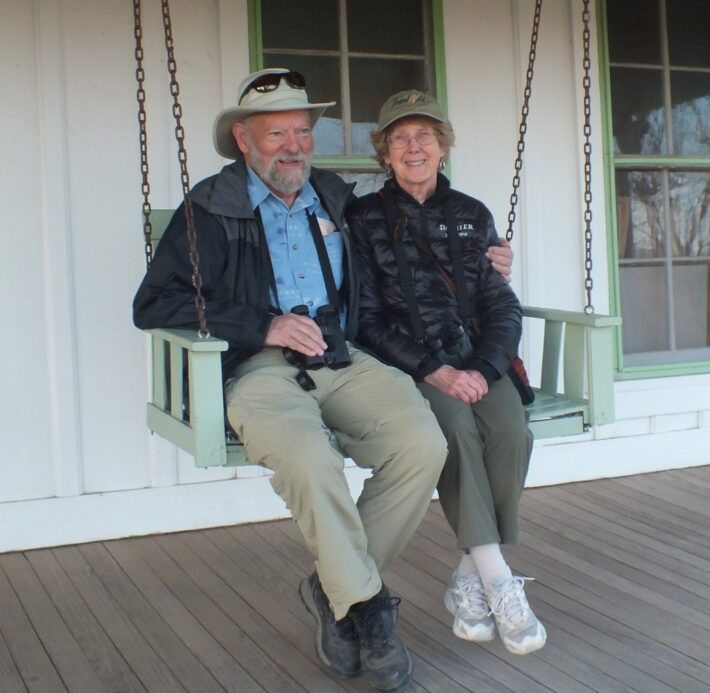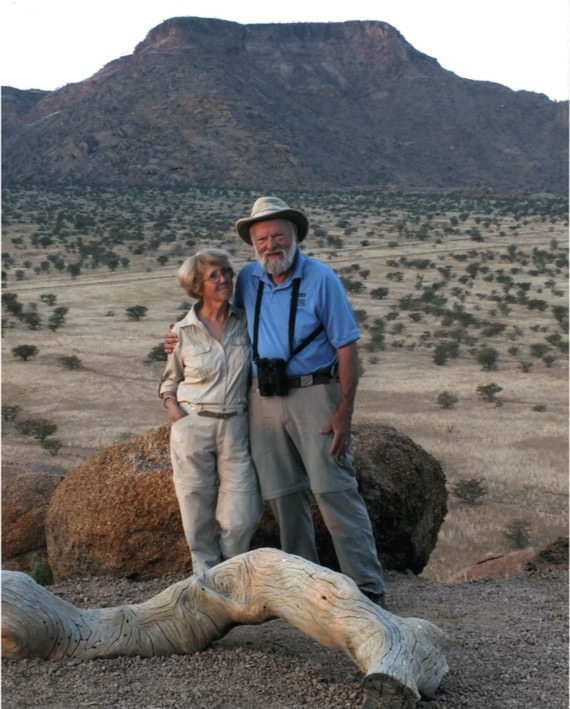Dave and Judy Osgood first discovered the then Ministry of Money in the late 1990s. Dave retired early from a biology professorship at Butler University to take up a second career running a company making electronic monitoring devices for use in animal research. Selling that company in 2005 provided the capital for Dave and Judy to become modest philanthropists, and they sought out the guidance of Faith and Money Network as they expanded their giving efforts. After traveling to Israel and Palestine on a Trip of Perspective in 2005, they both joined the board of directors.
In this interview, they share the story of how their lives became entwined with FMN’s work and mission, and how they have learned from others in the network as well as passed on their values-aligned giving habits.

Brittany Wilmes, Faith and Money Network: How did you discover Faith and Money Network?
Dave Osgood: It’s actually a pretty good story!
Judy Osgood: Years ago, there was an article in Reader’s Digest about three innovative churches around the country. One was the Church of the Saviour in D.C., one was a Catholic church a block from the Presbyterian church that we attended at the time in Indianapolis, and the third was a church in St. Louis, where a friend of ours had belonged for a number of years. She was always telling us things about her church, and we went to the local Catholic church for concerts and events, and we were friends with the senior pastor. At the time, we were often going to D.C. on business trips, and we told ourselves, we need to find a way to visit the Church of the Saviour on a Sunday morning.
We went one Sunday when we were in town, and a little girl who I’d never seen before, maybe two years old, crawled up into my lap and fell asleep for the rest of the service. Right away, I felt like we belonged. I was intrigued by a brochure about the Ministry of Money, and I took it home. A while later, I was asked to chair a building campaign for our church, which we’d really outgrown. At about the same time, we were on the newsletter list for the Ministry of Money, and we got the information about a basic workshop on giving. I thought, if I’m going to lead this committee, it would be nice to take this workshop.
Dave: About two years later, we attended a conference in D.C., and before the event started, we went to a Ministry of Money workshop. We heard all kinds of stories about how the piece of property (Wellspring/Dayspring) came to be, and the incredible lengths they went to to raise money among their parishioners. They borrowed money individually to toss into the kitty to buy the property. I thought it was quite amazing that individuals would borrow money just to give it away. When we got back home, I talked to the man who served as the liaison between the congregation and the builder. I asked him if there was anything we didn’t have money to do. He mentioned that the screen in the sanctuary was just a piece of glass, but it needed a projector, which would cost about $10,000. I said, “Do it. I’ll get you the money.” I called my banker, and he said, “OK, I’ll give you that $10,000. I know you’ll pay it back.”
That was the first time I ever borrowed money to give it away. That’s the kind of change that going to this workshop created in me.
Judy: Would we be the people we are now if we hadn’t gone to those workshops? I think the answer is no.
Dave: Later, we hosted two different Faith and Money Network workshops in Oregon. One was in the Portland area, a two-day workshop, and several board members arrived to put it on. We just made the logistical arrangements. A couple of years later, we did another two-day workshop in our church that was attended by local people who could drive there.
Tell me about your experience traveling to Israel and Palestine on a Trip of Perspective.
Dave: We took that Trip of Perspective in 2005, the year we retired and were in the works of selling our business. We flew to Israel and spent almost two weeks in a van driving around the West Bank and other parts of Israel. We met with 24 different nonprofits working for peace, and it was a fantastic learning experience. We also made Muslim friends who we still keep in touch with after 20 years.
Judy: We were both a bit apprehensive about the trip because we didn’t know what to expect and we were concerned there might be expectations for our time, as well as requests for financial contributions that we weren’t willing to commit to. None of that happened. That isn’t the kind of trip that Faith and Money Network leads.
What happened was an extraordinary experience. As Dave mentioned, we met with representatives from 24 different groups or organizations that were working for peace and had ample time to ask all of them many questions. A pastor friend who had visited Israel and Palestine the same year was overwhelmed by the depth of the experiences we had, as well as by our access to Jewish, Muslim and Christian organizations that were working for peace. We came home determined to maintain contact with a Jewish organization working for peace, a Catholic-run school for children of all faiths who had been severely traumatized by the war, and a Muslim family who works with both Jewish and Christian groups in an effort to bring peace to the land.
As a result of that trip we both feel we are far more sensitized to the struggles of other nations and other peoples we encounter.
In fact, that trip opened our eyes to the fact that we had a lot to learn about the rest of the world. After traveling with Faith and Money Network, we led trips to Guatemala for 13 years for our church’s ministry there. We built houses for Habitat for Humanity and are still very much involved with a school project, San Lucas Toleman Scholars. We were on their board until last year.
After that trip, how did you come to be more involved with Faith and Money Network leadership?
Dave: I joined the board of directors in 2006, and Judy joined at the same time. We just retired together from the board at the January 2025 meeting.
Judy: I wrote a regular column for Faith and Money Network called Soulful Money Matters for six years. Mike knew that I was a writer and asked me if I would do it. I really enjoyed it.
Dave: It was a change from the writing for the business, where she was writing instruction manuals and advertising materials. … But it’s all related. When we sold the business, there were 33 people coming to work every day and they were all making living-wage salaries.
Judy: We knew that we were succeeding because of our employees, so we made all of them stockholders. When we sold the business, they all profited.

What have you learned from your involvement in FMN?
Dave: One thing that we like to talk about is a practice we learned from Bob Hadley, who was a board member for many years. He and his wife tried to pass the concept of philanthropy onto their three children by giving them checks at Thanksgiving with the instructions they were to give that money away by Christmas. They didn’t put limits on it, but said the money could either go to charities or to individuals they knew who had a specific need. Their Christmas gifts to their parents should then be stories about what they did with the money.
We were so impressed with that idea that we started the same practice and found it very satisfying. Our two grandsons were very generous with their own funds before they were out of high school. Today all of us in our family make donations to one another’s favorite charities.
Any other relevant board experience or remarks on how FMN has changed over the past 20 years?
Judy: It has been interesting to see the different people that have been attracted to it and have joined the board. We learn from each other and have made great friendships. Andy and Susan have a socially responsible investing company, and we learned from them about that aspect of giving. We pick up from others how they are involved, what they do that’s “making a difference in the world.” That’s a phrase that I find myself using a lot because we try to use our gifts to make a difference. It helps us make choices about where we give our gifts. We appreciate reading things and learning about what other people have done.
Dave: We’ve done some public speaking together, and we try to literally pass the ball as a game when we do that. We did one for a major donor weekend at Habitat for Humanity (at the Carter Center in Atlanta), and we talked about the impact that we’d seen of Habitat’s philosophy of trying to provide decent housing for as many people as possible around the world. We were originally attracted to it by the local Habitat group started in Bend, in our First Presbyterian Church of Bend, Oregon. We love seeing people get involved and learning from what’s going on.
What advice would you give to someone new to FMN?
Judy: I think that Faith and Money Network has probably had an effect on everything we’ve done. FMN’s Money Mentoring program is very helpful, but also: read the newsletters, learn what they’re doing, see what may be available in the form of workshops, classes, webinars and trips. Sometimes it doesn’t take very much to know, oh, I want to know more about what this group is doing and how it may have an impact on my life. We can all learn from each other.